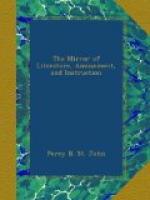The following considerations present themselves in this place.—Small rooms in winter are more dangerous to health than large ones, because the cold air, entering towards the fire by the doors or windows, reaches persons before it can be tempered by mixing with the warmer air of the room—Stoves in halls and staircases are useful, because they warm the air before it enters the rooms; and they prevent the hurtful chills often felt on passing through a cold staircase from one warm room to another. It is important to admit no more cold air into the house than is just required for the fires, and for ventilation; hence there is great error in the common practice of leaving all the chimneys that are not in use, quite open; for each admits as much air as a hole in the wall would do, or a pane deficient in a window. Perhaps the best mode of admitting air to feed the fires is through tubes, leading directly from the outer air to the fire-place, and provided with what are called throttle-valves, for the regulation of the quantity; or the fresh air admitted by tubes may be made first to spread in the room, having been warmed during its passage inwards, by coming near the fire.—In a perfectly close apartment, ventilation must be expressly provided for by an opening near the ceiling, to allow the impure air rising from the respiration of the company to pass away at once; but with an open fire, the purpose is effected by the frequent change of the whole air of the room which that construction occasions.
With a view to have the most perfect security against cold blasts and fluctuation of temperature in rooms intended for invalids, and still to retain the so much valued appearance of the open fire, a glazed frame or window may be placed at the entrance of the chimney, so as completely to prevent the passage of air from the room to the fire. The close room will then be warmed by the fire through the glass, as a green-house is warmed by the rays of the sun. It is true, that the heat of combustion does not pass through glass so readily as the heat of the sun; but the difference is not important. The glass of such a window must, of course, be divided into small panes, and supported by a metallic frame work; and there must be a flap or door in the frame work, for the purpose of admitting the fuel and stirring the fire. Air must be supplied to the fire as described above, by a tube leading directly from the external atmosphere. The ventilation




